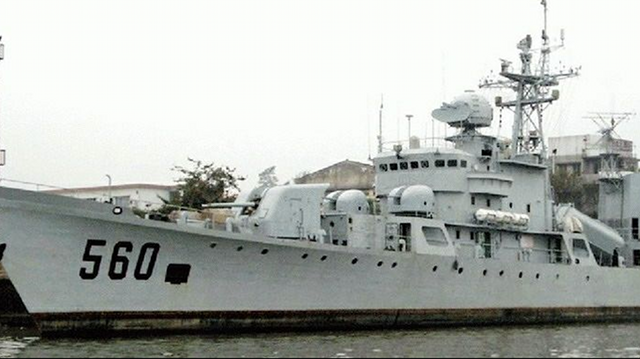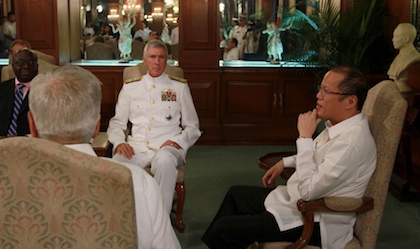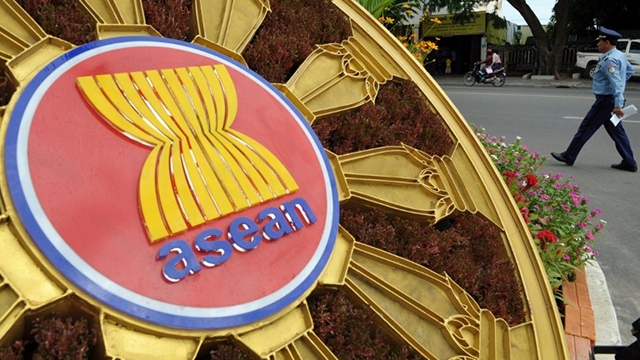SUMMARY
This is AI generated summarization, which may have errors. For context, always refer to the full article.

MANILA, Philippines – True, the Scarborough Shoal dispute has brought Philippine-China diplomacy to its lowest point in years. But the tension also has a silver lining, a Southeast Asian analyst told Rappler.
“In some ways, the Chinese aggression is very good for the Philippines,” said Zachary Abuza, political science professor at Simmons College in Boston, on Rappler’s Talk Thursday. China’s aggressive behavior in the South China Sea, which resurfaced in April, has “done more to galvanize Philippine nationalism than anything in the past few years,” Abuza explained in his interview with Rappler executive editor and CEO Maria Ressa.
It has also made the Philippines realize the importance of deepening and broadening alliances, Abuza noted. In particular, he cited the Philippines’ efforts to strengthen ties with the United States and other affected countries in the Association of Southeast Asian Nations (Asean).
“The future of Philippine security is going to be in a very unified Asean… The future of Philippine security is going to be based on diplomacy in the region, and I think the Philippines is smart to continue to deepen ties, to continue to build consensus,” said Abuza. (Watch the interview below.)
Military might
Tapping allies will help the Philippines, he explained, because it can hardly match the Chinese military.
Based on data from the Stockholm International Peace Research Institute, the Philippines’ military spending was less than 2% of China’s in 2011. China’s military also dwarfs the Philippines’ in terms of personnel, said the Center for Strategic and International Studies.
The Philippines, in this context, has been working with the US toward a “minimum credible defense.”
President Benigno Aquino III has thus met with top US officials to boost military ties between the two countries. Recently, Aquino met with US Pacific Command Admiral Samuel Locklear and, before this, US President Barack Obama himself.

At the 45th Asean Foreign Ministers’ Meeting in Phnom Penh, Cambodia, the Philippines also drummed up regional support over the South China Sea issue.
Countries like Singapore, Indonesia, Malaysia, Thailand, and Vietnam backed the Philippines’ proposal to include the discussion on Scarborough Shoal in the Asean summit’s traditional joint statement, according to a paper by Department of Foreign Affairs (DFA) Undersecretary Erlinda Basilio.
In an unprecedented move, however, Cambodia, which chaired the summit, decided not to issue a joint statement.
Cambodia unfit
Abuza said the Philippines can “build on debacles” like the incident in Cambodia last week.
“That could help galvanize the rest of Asean together, and treat Cambodia and the Cambodian leadership as pariahs, as they should be treated,” he explained. “Cambodia has proven that it is not only unfit to be a member of Asean, but certainly unfit to lead it.”
Abuza, who also specializes in security issues, recalled the impact of Asean’s unified stand. He cited, in particular, a previous Asean statement expressing concern over developments in Mischief Reef, which involved China and the Philippines.
In a statement issued in March 1995, Asean foreign ministers called upon involved parties “to refrain from taking actions that destabilize the region and further threaten the peace and security of the South China Sea.” “We specifically call for the early resolution of the problems caused by recent developments in Mischief Reef,” the ministers then said.
“China was really shocked at the time that Asean really got together and came together and demanded China to stop – and they backed down,” Abuza noted. “Even dictatorships are accountable and responsive to public pressure.”
China’s interests
Other observers also see the importance of a unified Asean stance.

This is because a divided Asean is in China’s interests, said Ernest Bower, senior adviser and director of the Center for Strategic and International Studies’ Southeast Asia Program.
“Filipinos should know what happened in Phnom Penh and understand that the message from Cambodia is not ‘Asean is messy and we should proceed carefully and reduce our engagement and investment,’ but rather ‘Asean unity is not supported by China and this is an indication we need to redouble our efforts to engage and support Asean’s goals for unity,’” wrote Bower in a Thought Leaders piece for Rappler.
Concern for fellow Asean members is crucial in the community building process, said another analyst, Julio Amador III, who works as a foreign affairs research specialist at the Philippines’ Foreign Service Institute. He also wrote about this for Rappler.
“The Scarborough Shoal, along with the whole West Philippine Sea, should become an Asean issue as well because they are Southeast Asia’s maritime heartland,” Amador said. – Rappler.com
Add a comment
How does this make you feel?
There are no comments yet. Add your comment to start the conversation.